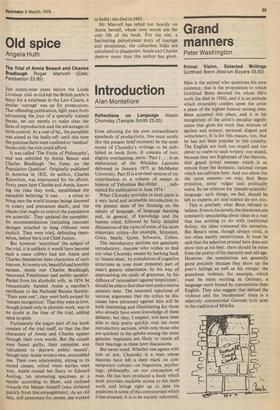Introduction
Alan Montefiore
Reflections on Language Noam Chomsky (Temple Smith £5.00)
Even allowing for his own extraordinary standards of productivity, this must surely (for the present brief moment) be the most recent of Chomsky's writings to be published in book form. It consists of two, slightly overlapping, parts: 'Part I . • • is an elaboration of the Whidden Lectures delivered in January 1975 at McMaster University. Part II is a revised version of my contribution to a volume of essays in honour of Yehoshua Bar-Hillel . . . , submitted for publication in June 1974.'
What Chomsky provides in both parts is a very lucid and accessible introduction to the present state of his thinking on the nature of language, of language learning and, in general, of knowledge and the human mind, followed by fairly detailed discussions of the views of some of his more important critics—for example, Strawson, Once, Searle, Quine, Schwartz, Cohen.
The introductory sections are genuinely introductory. Anyone who wishes to find out what Chomsky means by harking back to 'innate ideas', by postulation of cognitive structures as (one must presume) part of man's genetic inheritance, by his way of approaching the study of grammar, by his defence of 'rationalism' against 'empiricism', should be able to find clear and authoritative answers here. The reasoned rejections of various arguments that the critics he discusses have advanced against him will be both interesting and illuminating for those who already have some knowledge of these debates; but they, I suspect, will have been able to skip pretty quickly over the more introductory sections, while only those who are quickest in the uptake among the more genuine beginners are likely to retain all their bearings in these later discussions.
But never mind. Whether one agrees with him or not, Chomsky is a man whose theories have left a deep mark on contemporary culture—on linguistics, psychology, philosophy, on our conception of man. He has here produced a book which both provides readable access to his main work and brings right up to date his positions in some of the controversies which it has aroused. It is to be warmly welcomed.


































 Previous page
Previous page